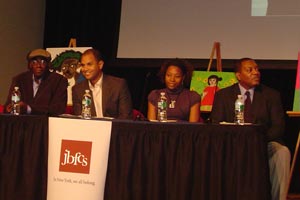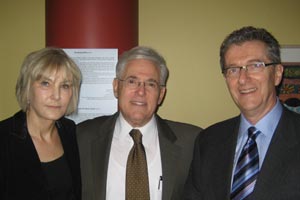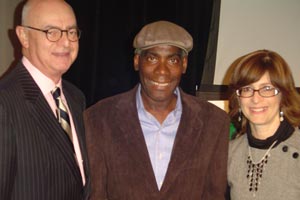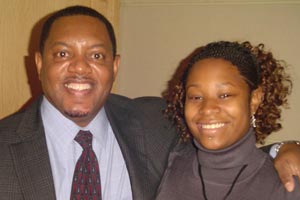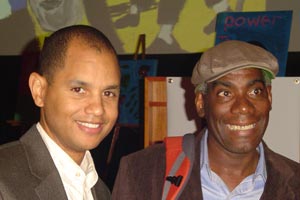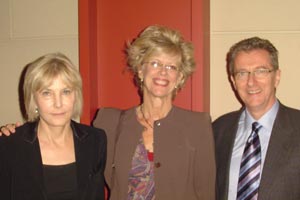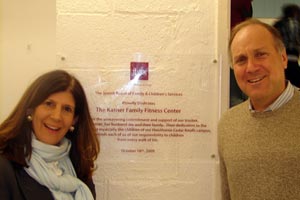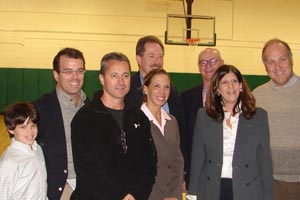News Archive: October 2009
October 22, 2009: The Alan B. Siskind Symposium: Person in the Center: Innovation and Change
ALAN B. SISKIND SYMPOSIUM OFFERS WAYS TO
TRANSFORM SOCIAL SERVICE ORGANIZATIONS IN NEW YORK
On October 22, the JBFCS programs The Center for Child Development and Learning, and Hawthorne Cedar Knolls, along with JBFCS-affiliate The Shield Institute, sponsored the Alan B. Siskind Symposium “Person in the Center: Innovation and Change.”
Keynote Speaker Beth Mount, Ph.D., discussed person-centered planning and organizational innovation. This was followed by a panel discussion on innovative practice at JBFCS. Beth Mount is the Founder and Director of Graphic Futures. She is an award-winning consultant to a variety of local, state and national and international projects seeking to strengthen the values, implementation practices and innovative policy initiatives related to person-centered planning and service design.
JBFCS Chief Psychologist Bruce A. Grellong says “This symposium examines the person-centered planning model, its application in different systems of care, the self-actualizing possibilities it creates for people with disabilities and how organizations can bring about change within and across various systems of care.” Dr. Grellong is Director of The Center for Child Development and Learning.
Person-centered planning is a process that builds on the capacities of individuals, their families, neighborhoods and support staff. It provides a means for individuals to maximize their contributions to society and realize their dreams of full inclusion. Person-centered development is growing throughout the fields of developmental disabilities, mental health and child welfare organizations. Person-centered work invites deep changes at all levels of organizational practice and requires significant investments in personal development and organizational innovation.
A Roadmap for Change
Person-centered planning is changing how people view the futures of individuals with disabilities. This approach is often referred to as a “paradigm shift” away from traditional institutional and managed care models of service delivery toward community supports that empower people to follow a more personal and meaningful path to inclusion.
The person-centered approach relies on partnerships between natural supports and the service system that maximize the person’s strengths and preferences and their membership in community life. The person-centered approach creates a team of people who know and care about the individual with a disability, who come together to develop and share a dream for the person’s future, and who work together to organize and provide the supports necessary to make that dream a reality.
According to Beth Mount, “Person-centered planning requires a new and different way of thinking. No longer do we rely on the system and say ‘We are sorry, our school and community do not offer that service.’ Instead we learn to say, ‘This is a reasonable and positive goal for this individual. Let’s figure out how we can work together to make this happen.’”
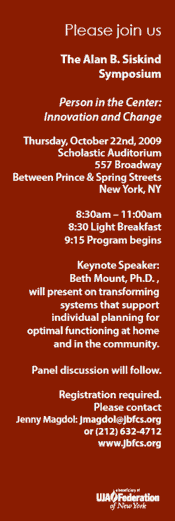 |
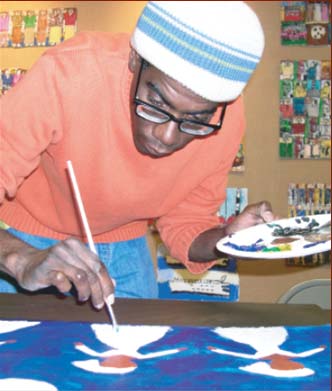 |
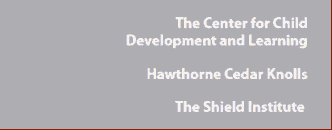 |
October 18, 2009: JBFCS Dedicates Newly Renovated Hawthorne Cedar Knolls Gymnasium and Kasner Family Fitness Center
Honorees Karen and Jay Kasner are Recognized for Outstanding Service.
On Sunday, October 18th, 2009, JBFCS celebrated the completion of the Hawthorne Cedar Knolls Gymnasium renovation project as well as the dedication of the Kasner Family Fitness Center in honor of Karen and Jay Kasner. Karen Kasner is a JBFCS Trustee. Over one hundred friends, staff, and residents of HCK were on hand to celebrate with a basketball clinic, yoga sessions, craft projects and a barbecue. Assemblywoman Amy Paulin, of Scarsdale, NY, presented the Kasner family with a citation in recognition of their having spearheaded the effort that raised over $1 million for the renovation. The children and staff of Hawthorne Cedar Knolls were thrilled at the prospect of being able to use this new state-of-the-art facility.
Hawthorne Cedar Knolls, the JBFCS Westchester campus, is home to four distinct centers serving some 300 at-risk youth from throughout New York City and the metropolitan area. Its programs are considered among the most innovative in the country. Two schools on the campus, which are part of the New York State Act School Districts, provide an environment tailored to the needs of children who struggle with learning and emotional problems.
According to Paul Levine, JBFCS CEO and Executive Vice President, “One hundred years ago, JBFCS leaders of New York Philanthropy traveled to Hawthorne, New York to establish a refuge for children in trouble - Hawthorne Cedar Knolls. Today we honor the Kasners who have carried this torch of generosity even further... JBFCS is delighted to pay tribute to this most well-deserving and devoted couple.”
Honorees Karen and Jay Kasner, and their sons Brett and Jared, have volunteered on the Hawthorne campus for the past ten years. They have been an inspiration, leading the way in a number of vital campus initiatives, including a library, a music program and the new fitness center. Karen serves on the JBFCS’ Board of Trustees, Executive Committee, Legislative and Public Policy Committee, Westchester Divisional Board, which she formerly chaired, Quality Management Committee and UJA/JBFCS Liaison Committee. She is the Chair of the Westchester Government Relations Committee of UJA-Federation, a member of the Network Commission and several Task Forces of UJA-Federation and a member of the UJA Public Affairs Committee. Karen is well recognized in federal, state and county government circles by elected officials as an important advocate for those-in-need. Both Jay and Karen are members of the Westchester Board of American Jewish Committee and former Co-Chairs for the Parents Fund of the University of Pennsylvania.
Jay Kasner is a Senior Partner at the New York law firm of Skadden, Arps, Slate, Meagher & Flom, LLP. He specializes in securities and corporate litigation. Jay is one of only three lawyers in New York ranked in the top tier for securities litigation for three consecutive years in Chambers USA: America’s Leading Lawyers for Business. Mr. Kasner was also named by The Best Lawyers in America 2006 and 2007 as one of the top 25 lawyers in New York for “bet the company” litigation matters.
October 9, 2009: New MIMS Training on Lesbian, Gay, Bisexual and Transgender Issues
 Created by:
Created by:
Caroline Peacock, LMSW
Christina Grosso, LCAT, ATR-BC, BCETS
Jewish Board of Family and Children’s Services
Center for Trauma Program Innovation
Westchester Children’s Residential Division
My Identity, My Self (MIMS) is a new two-part training for staff and one-part psychoeducation group curriculum for youth on the topic of lesbian, gay, bisexual and transgender issues. This project was funded in part by a mini-grant from the National Center for Child Traumatic Stress (NCCTS), the coordinating center of the National Child Traumatic Stress Network (NCTSN), and by the Substance Abuse and Mental Health Services Administration. The curriculum was initially created for a residential treatment setting for adolescents, but it is applicable in many other youth-oriented settings.
Training 1 is LGBTQ 101. Participants are introduced to definitions, common misperceptions about LGBT individuals, language, history, and policy. This training lays the foundation for Training 2. Training 1 has a interactive trivia game.
Training 2 is Working with LGBTQ Youth. The purpose of this training session is to help participants learn how to support LGBTQ youth in real life situations, such as in coming out and dealing with discrimination and harassment. Training 2 is also interactive, with role plays and group discussion.
The Group Psychoeducation Curriculum is 10 sessions. The first 2 sessions are for all youth, and focus on issues of identity. The inclusion of sexual orientation and gender identity into these two sessions for all youth help to decrease teasing and bullying through increasing understanding about aspects of identity. The remaining 8 sessions are for LGBTQ identified youth. Session topics include coming out, dealing with family and friends, living a healthy lifestyle, and planning for the future.
For more information on the MIMS curriculum and training offerings contact Caroline Peacock at cpeacock@jbfcs.org or Christina Grosso at cgrosso@jbfcs.org. The printed version of MIMS will be available for purchase and is user-friendly for training events. [Download the curriculum]
|
|||||||||||||||
| Home | About JBFCS | Programs & Services | Professional Training |

